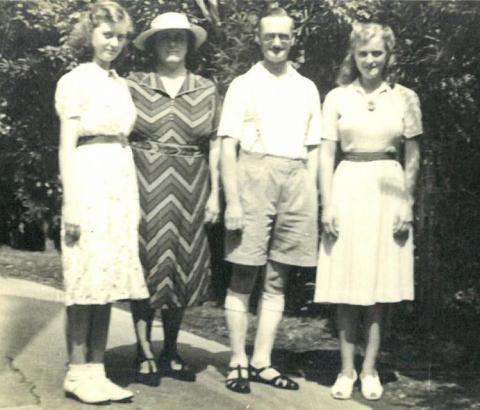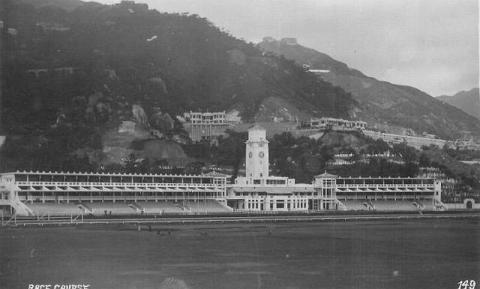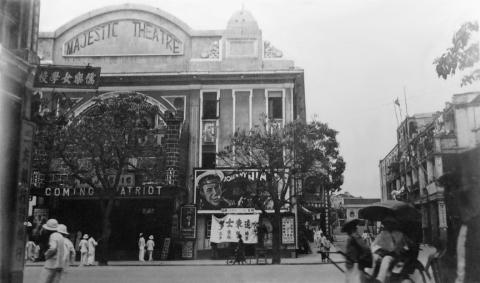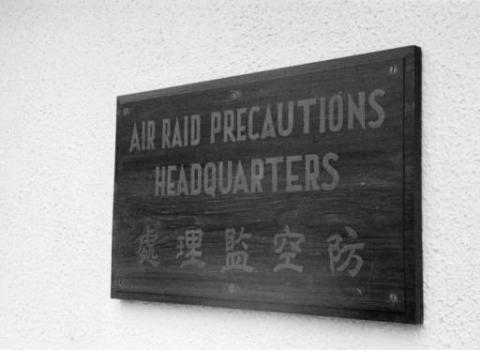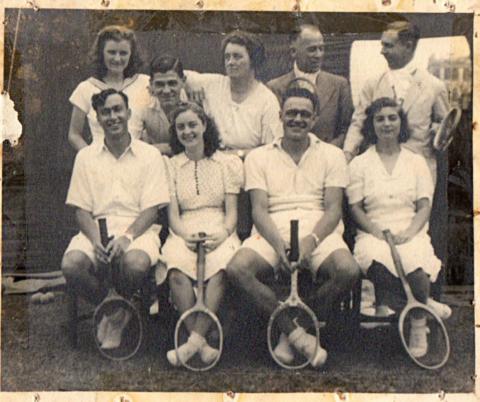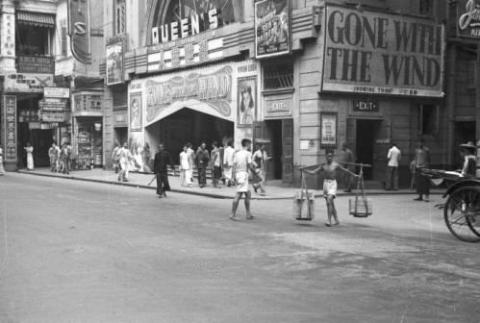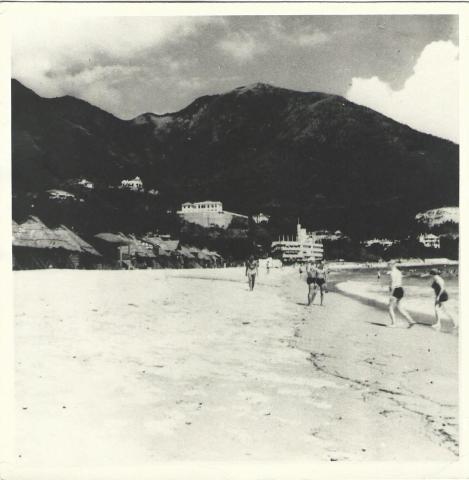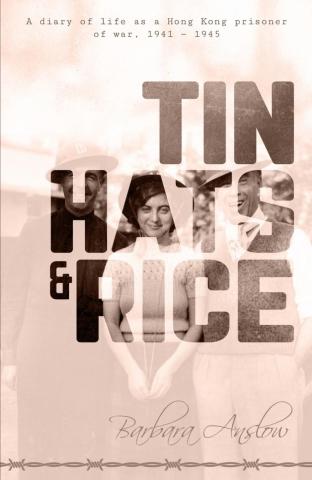Barbara Anslow has previously shared extracts from her diaries in the article "Memories of life in Hong Kong, 1938-39". The end of 1939 was roughly half-way through the period known in Britain as the "Phoney War": Britain had declared war against Germany that September, but in the months that followed, nothing much seemed to happen.
In this article, Barbara tells us of her experiences in Hong Kong in 1940 and 1941, again drawing on her diaries from those years. She soon reports the end of Britain's Phoney War:
10th May, 1940. ‘Germany invaded Holland and Belgium.’
That increased the preparations for war in Hong Kong, and a few weeks later Barbara was on board a ship heading to Manila, as British women were evacuated from Hong Kong. But tragic news brought her back to Hong Kong again, and she again experienced that odd sense of being at war, and yet removed from it. In October 1940, she comments:
'Meanwhile Hong Kong life continued pleasantly. We played tennis when it was too cold for swimming; often went to a skating rink where I never learned to skate. It sometimes seemed wrong to be enjoying life when such dreadful things were happening in England - the devastation of Coventry, Plymouth, children evacuated. We had no rationing or food shortages.'
Despite the pleasant times, as we follow the diaries through 1941, it is clear that time was running out:
4th Jan, 1941. ‘Jimmy has depressing views on the local situation. He and Skinner both think, it seems inevitable that there will be an attack on here before the war is over.’
4th May, 1941. ‘Wonderful day at the beach - so lovely that I am afraid that the promise of a summerful of these days can’t be fulfilled because of war.’
17th Nov, 1941. ‘Once again the Japs look like business and they can’t call it off once again.’
Over to Barbara for the full story:
1940
Background. This photo was taken in 1940, at Naval Terrace where we lived. The Terrace was part of the Royal Naval Dockyard, where my father worked. Left-to-right, the photo shows my younger sister Mabel, my mother (also Mabel), my father William, and my older sister Olive:
I was working at the Air Raid Precaution (ARP) Department, and often had to work late at the office and at weekends. My salary had risen to $200 a month. I paid $100 to my parents for my keep, but that left me plenty of money to buy clothes and see films, etc.
3rd Jan. ‘The Japs are protesting because we took some Nazis of military age from the Asama Maru.’
24th Jan. ‘The Exmouth has gone down with all hands, about 170. Still trouble with the Japs.’
26th Jan. ‘A lot of new fellows (soldiers) out from Home, volunteers.’
31st Jan. ‘In came Paddy, rather merry, carrying all he has. Off he went, and is going to France, bless him.’
19th Feb. ‘HMS Daring has been sunk.
Marvellous incident in Norway - the German Altmark had about 300 British prisoners (merchantmen) on board, and HMS Cossack went in and boarded Altmark and released the prisoners.’
27th Feb. ‘Mum and Dad’s Silver Wedding anniversary. We had dinner and dancing at the Hotel, with some of their friends.’
2nd March. ‘Pyrrhus (Blue Funnel) sunk’
8th March. ‘Ship Queen Elizabeth arrived in New York, hardly anyone knew she had gone.’
14th March. ‘Olive and I went to First Aid lectures at the Helena May, Dr Valentine gave this.’
25th March. ‘Went to Races with Olive, we spent $2.00 each ... an expensive experience.
I went to Majestic Theatre in Kowloon and met Mrs Dewar. Someone had just snatched her handbag (she was with Mr. Dewar), and when he grabbed the thief, he - the thief - pulled out rusty old scissors and tried to dig them into Mr Dewar’s hand.'
26th March. ‘Last week was the first since outbreak of war in which no British ships were lost.
Letter from Aunt Lily (in Gillingham, Kent) the dogs are on horsemeat, coal has to be ordered 3 weeks in advance. Auntie says if it wasn’t for the journey she would come out here.’
'I don’t think Dad is very well, ...'
31st March. ‘I don’t think Dad is v. well, he’s been sick a little lately.’
6th April. ‘Olive, Mabel and I, by John Braga’s invitation, met him in afternoon plus small friend Constantine. John was a gifted violinist, a brother of Caroline, Mabel’s piano teacher. He took us for a drive in the New Territories, (then mainly agricultural), talking all the time about his prospective bride in UK whom he called Lady Louie. We did some hiking, and learned how John had gone up country in China and taken money to a Chinese School for the Blind. On the way home he took us to meet a family with girls surnamed Gehring.’
(John Braga spent the war in Macao with wife and two children, and used to play the violin in the streets there to get money to live.)
9th & 10th April. ‘I had nearly 30 pages of shorthand at the last minute for a sudden press notice (about ARP). Germany invading Denmark, awful battles and sinkings are supposed to be going on, Germany starting on Norway etc.
11th April. Blackout practice. HMS Glowworm is presumed sunk. HMS Rodney was bombed but it didn’t make any difference!
21st April. ‘Princess Elizabeth’s 14th birthday’ - (and 53 years later, the birthdays of daughter Maureen’s twins Leonardo and Angelo, who are now 14 years old.)
About this time was the first meeting of a literary group started by Arthur Gee a journalist, in his little bed-sit at Courtlands boarding house on Kennedy Road. Others present were American Julie Wilson, Dorothy Cavell a Govt, school teacher, and a Mr. Meyser. Arthur very young, energetic, restless, fidgetting, vibrant and alive.
26th April. Olive and I found that Paddy Gill had married his Chinese girlfriend Billie on 21st Jan, the day he came to say goodbye to us before leaving Hong Kong. She didn’t leave with him as he was with Army. She had a very good job in HK.
1st May. ‘German bomber came down in residential area of Clacton, crew killed, about 100 wounded and 1 killed. We don’t seem to be doing too well in Norway.
Italy, crisis pending. We are diverting ships to Cape route, leaving out Mediterranean.’
3 rd May. ARP HQ moved to new building in Happy Valley.
‘Hold-up in Sennet Freres yesterday (jewellers in Central) at 5pm. Dubois died today from shot.’
4th May. ‘Mabel and I went to see ‘Intermezzo’. Good English newsreel. Clappings in audience when Australian troops shown embarking (for UK).’
6th May. ‘Our (new) office lovely, overlooking the green Valley, all the little British children playing on the grass.’ (Civil Service and other clubs were in that part of Happy Valley.)
The end of Britain's 'Phoney War'
10th May. ‘Germany invaded Holland and Belgium.
Following are extracts I took down from radio news:-
- German forces attacked Holland, Belgium, and Luxembourg in the early house of this morning, both by land and air. These countries at once put their defence plans into operation and are now resisting the Germans. At the same time they appealed immediately to Britain and France for help, and the Allies are putting into effect plans worked out to meet this contingency. In this country the Minister of Home Sec has issued a warning to all ARP services to be on the alert, and the general public to carry their gas masks, and to check their preparations.
- Forces landed in Iceland as a precaution.’
11th May. ‘Mabel had first date tonight, to pictures with George Kirman.
Bits from the radio news:-
- All the aerodromes captured by Germans in Holland and Belgium have been recaptured from them.
- Mr Churchill now Prime Minister, Chamberlain still in Cabinet (rousing speech in that old gentle voice about resigning.).
- In Japan an emergency meeting of the Cabinet was held today. After the meeting lasting 2 hours it was decided to send formal notes to the Powers concerned reaffirming that Japan would be deeply concerned over any development of the war in Europe which might affect the status quo in the DEI (Dutch East Indies).’
13th May. ‘Princess Juliana and the two princesses have just arrived in London.
The Germans are pressing on – “the line bends but does not break” according to the placards.’
15th May. ‘Most of Holland has surrendered.’
16th May. ‘Great battle raging for Brussels, and Germans have got through along the River Meuse.’
18th May. 'Part of a communique on this evening’s news:
During the night of 16/17 May, certain readjustments to the front became necessary, the BEF was withdrawn to a position west of Brussels. This re-adjustment was carried out without any interference. There is no question of any collapse or breakdown in this section - as suggested by the German communique.
General Gamelin - C-in-C of the Allied armies, has issued an Order of the Day ‘The fate of our country and that of our Allies and the destinies of the world depend on the battle now in progress. British, Belgian and Polish soldiers and foreign volunteers are fighting at our side, and the R.A.F.’
Germans 120 miles from Paris.’
19th May. ‘Position being represented as serious.’
21st May. ‘Position supposed to be improved, though feared Germans moving towards the Channel.
Olive had a good idea, that in England no one should wear hats, thus no spies could disguise themselves by those means.’
24th May. ‘News bad, Gap between the French and British army. Emergency Powers in force in England. Sir Oswald Mosley arrested.’
27th May. ‘Germans have Boulogne, and from Yarmouth to Folkestone the coastal towns have been evacuated.’
28th May. ‘Terrible news - King Leopold has ordered Belgium to capitulate, without reference to Britain and France, and against the advice of the Belgian Govt. It leaves most of the BEF (British Expeditionary Force) and some of the French in an awful position. It doesn’t seem as if things can get much worse before the end... unless Italy comes in and France gives up.’
30th May. ‘War news no brighter’
31st May. ‘Some of the troops are safely back in England but we have lost 3 destroyers and a transport.’
1st June. ‘Heaps of BEF are safely back. Italy still being troublesome - relations broken off with us.’
3rd June. ‘Poor Mum is so upset, letter just came from Auntie Lily, enclosing a closed envelope to be opened “in case anything happens to us” saying who they would like to have “our little possessions.” (Mum was the main beneficiary).
Four fifths of the BEF were rescued. They don’t say what happened to the rest. We appear to be shooting down planes ‘like knocking apples off a tree’ according to the RAF. Italy threatening to enter war any minute. Japan next, I’m afraid.
Lovely organ music on radio, giving courage. I think even the people at Home who must be all nerves, would feel soothed.’
5th June. ‘Dad had the doctor call today.’
6th June. ‘We are evidently trying a new offensive across the Somme, and have had to withdraw a little already. Dad still at home but seems better today.’
7th June. ‘Raids over England yesterday reported, no deaths just a few casualties.
Dad says he is better but his hands are shaking a lot.’
10th June. ‘Germans still seem to be getting through parts of the Somme. Dad much better.’
11th June. ‘Italy has declared war. We have withdrawn from Norway and lost the Glorious, 2 destroyers, and a tanker and Orania a large troopship. People evacuating Paris, but for all that, none of us feel we can lose. USA declared they will give us all possible material help.’
12th June. ‘Italians have bombed Malta and Aden. We have bombed Italy.’
13th June. ‘King’s birthday, therefore a public holiday, but I went to office in morning and got a lot of work done. DARP (Director of Air Raid Precautions) there too.
French have pushed back from Paris, an advance of 5 miles. We have lost a Division - surrounded and mostly taken prisoner by Germans.’
14th June. ‘Paris declared an open city in an attempt to save the Art treasures, and Germans are supposed to have entered. This from U.S. Mr Bullitt in Paris.
Reynaud appealed to USA last night, and they are trying to work out new ways to help - as if there isn’t only one way, we all think that.
No more air mails to UK now, except at some abortive rate, $2.80.’
15th June. ‘Have decided to join the ARP Auxiliary Reserve, to man the First Aid post at ARP HQ, suppose we are not compulsorily evacuated. Olive wants to be a blood donor.’
17th June. ‘Almost impossible to imagine - France has given in. First, they formed a Military Got. But now they are seeking terms. Dad says he expects they (Germans) will take the French navy. Can’t understand, in the security (at present) of Hong Kong, how France could give in when the Germans have by no means completely overrun France. Perhaps we are going to be beaten, and have Hitler laughing at us. And the smug US still showing off their planes in films.
Mabel went for typing test at HQ China Command and has the job - 8.30 to 1pm and 2.30 to 4.30pm, $200 a month, she will have to pay income tax.
Olive to Queen M Hospital (Queen Mary Hospital / QMH) with suspected malaria.’
18th June. ‘France has rejected the terms, yet they say they are still awaiting Hitler’s and Musso’s decisions at Munich. Talk too of a “France-British Union.”
Ah Ting had a baby girl this morning. Olive is giving $100 to the War Fund, so has Mum. I gave $45.’
19th June. ‘France appears to be sending plenipotentiaries to discuss terms of an armistice, but Churchill says we must fight on whatever happens.’
21st June. ‘To QMH after work (5 cents on bus) to see Olive, she’s coming home tomorrow. I don’t think Dad is very well.’
23rd June. ‘French have signed Armistice, and Germans control the coast from Norway down to Brest, but it means that all our defences will be concentrated in England. Plans to send UK children to Canada.’
'Japan beginning to be troublesome.'
25th June. ‘News bad. France accepting everything imposed on her. As China Mail says - France under lock and key.
Japan beginning to be troublesome. Trying, part of the Cabinet, to drop their neutrality, and they are trying to pick a quarrel on account of arms passing through Hong Kong etc. and Burma to China.’
26th June. ‘Loads of publicity being given to the Japs, it was first on the London radio news tonight. But I refuse to think too much about it, must believe in a future.’
27th June. ‘The Japs are going to “define their attitude”. Mr Hamilton, Superintendent of Imports & Exports, Olive’s boss, told her she would probably be needed in office in an emergency.’
Evacuation from Hong Kong
28th June. ‘ “Our orders are - to Fleet Accommodation Barracks in Naval Dockyard at 9.30am on Monday morning.” Dad phoned this message to Mum in the afternoon, Service families were to be evacuated from Hong Kong. That evening the radio news didn’t make things sound so serious, but Dad said he thinks that is so as to arouse no panic.’
Dad insisted we prepare for this evacuation, although Mum was in the ANS (Auxiliary Nursing Service), and Olive’s and my jobs in the Govt, were ‘essential services’ so we 3 could have exemption. Mabel however was 16 so would have to be evacuated. We packed suitcases that night.
29th June. I explained to my boss Mr. Puckle (Steele-Perkins had gone to India to be DARP there) that if Dad’s family disobeyed the evacuation order, the Admiralty would wash their hands of us, i.e. might refuse to pay our passages back to UK ultimately. Mr. Puckle promised to guarantee that I’d get to UK eventually.
1st July. ‘Mum, Olive, Mabel, and I went to FAP, hung about in hot queues, then on board grey Empress of Japan alongside Dockyard wall. After all women and children were aboard, our menfolk were allowed to come and say goodbye. Dad produced a letter which had arrived for Mum during the day, giving her exemption from evacuation as she belonged to the ANS - Mum had been trying all weekend to get authority to stay. Dad wanted us all to go to safety but now Mum had legal authority to stay, Dad let her make her own decision.
What a decision for poor Mum: all our luggage was now in the ship’s hold, and Dad insisted that we 3 girls must leave even if Mum stayed. So Mum stayed on the ship which was a great relief to Dad. He told us that if the Japs attacked HK we would all be caught like rats in a trap.
All the unhappy Daddies trying to be so brave, most of the women were crying, even me.
Olive and Topper have become engaged, tho’ no ring yet.’
We sailed late that afternoon in murky weather, escorted by two destroyers. Almost every one was seasick. Meals in magnificent dining saloon, though on plain mess tables with forms for seats. Despite bad weather, there was always a queue at entrance door; the limited seating meant that only as diners finished eating and left could more be let in. Staff shorthanded, often a previous diner’s plate with leftovers would still be on the table when you took your seat.
Stale air in our cabin with porthole closed, almost unbearable, but we realised we couldn’t complain when we passed through the public rooms where hundreds of women and children were trying to sleep on camp beds, Many young babies were bottlefed, so boiling water had to be obtained from the stewards and bottles made up - all on a heaving ship.
Too windy to walk on open decks, but we did find one small lounge which still had its prewar furnishings. With others, we slept there that night rather than in the stuffy cabin.
The skies opened as we disembarked in Manila, soaking us and our luggage. American marines carried our luggage and led us in our squelching shoes to small army trucks with tarpaulin covers. We were driven to Fort McKinley to occupy blocks of wooden two-storeyed buildings on stilt-like foundations. With about 80 others we Redwoods occupied a top floor room, with brand new camp beds, bedding and mini mosquito nets. We ate in a building in the grounds where we had to queue outside in army style, given a tin mug, cutlery and mess tin, then filed past huge serving dishes for hot food, then found seats in the hall.
Beneath our billet was a communal washhouse - just a large room lined with washbasins, unscreened lavatories and shower bays. Despite the overwhelming kindness of the Americans, the days were very trying, with nothing to do and nowhere to go, except sit on our camp beds.
To make room for more ship loads of evacuees arriving from Hong Kong, our group was moved to a Women’s Club in California Street in the city. A wooden building on two floors. Camp beds were side by side; a long table with chairs which almost touched the ends of our beds. Few bathrooms, a great problem for mothers with infants for no disposable nappies then. We hung wet clothes on a creeper-covered verandah crowded with our heavy luggage. We couldn’t leave our billet because of constant flooding rain.
After a few days 6 volunteers were called for to transfer to a sugar plantation many miles out of the city. We Redwoods and two friends took up the offer, others were reluctant as it sounded as if the plantation was out in the wilds. In fact we found ourselves living in great luxury in bungalows normally occupied by American officials who were on leave in USA. There was a swimming pool, tennis courts, bowling alleys, and an excellent library; we found about 30 other evacuees there too. The food was magnificent. Splashing about in the huge baths in our bungalow - our first real wash since leaving Hong Kong - this was the first time we had been happy since then, our only anxiety was about our future.
Rumour was that we would be sent to Australia. We had a letter from Dad saying choose Sydney if you have a choice. I gave simple lessons to some of the children in the mornings. Our American hosts drove us to their coconut groves where we drank milk from coconuts.
Terrible news, and the return to Hong Kong
Then on July 24th we were given news that Dad had died of a heart attack.
Our hosts within hours had got us passages back to Hong Kong, but the funeral had already taken place by the time we arrived there. We had to vacate our Naval Yard flat, friends put us up until we rented a flat in Happy Valley. The Naval Yard people had already booked our passages back to UK but we persuaded them to let us remain in Hong Kong as Olive and I had our essential jobs back, Mum had exemption as she was ANS, and Mabel had her 17th birthday while we were negotiating and was to join the ANS.
The combined salaries of we 3 girls was enough for us to live on, and eventually Mum got a job as supervisor to a small baby whose Mother had died. The father employed Chinese servants in the home, but he wanted some one with more authority to be there when he was at work. We were fortunate to have a friend Jimmy who owned a matshed at Repulse Bay; his wife and children were in Australia, so most weekends he used to drive us there; he was company for us, and we were company for him.
As the months went on and there was no attack on Hong Kong, the fathers of the evacuated women and children kept up a barrage of requests for them to be returned, but the Govt, (fortunately) remained adamant. However there was still the threat of a Japanese attack in the air.
4th Oct. ‘It looks as if there’s going to be trouble with Japan and soon, we evidently intend to re-open the Burma Road.’ (So that arms could be sent to help China which Japan was overrunning.)
Meanwhile Hong Kong life continued pleasantly. We played tennis when it was too cold for swimming; often went to a skating rink where I never learned to skate.
It sometimes seemed wrong to be enjoying life when such dreadful things were happening in England - the devastation of Coventry, Plymouth, children evacuated. We had no rationing or food shortages.
I saw ‘Gone With The Wind’ which fired me with ambition to write something really impressive some day. I told my diary I actually felt I could do this!
That Christmas, two Chinese employees - colleagues of Dad at the Generating Station in the Naval Yard brought us traditional seasonal ‘cumshaw’ - raffia carriers with fruit. ‘Velly solly.’ Lam Fat, the older man, kept saying, meaning the death of Dad. ‘I work on same shift as Master, now, no can see him any more.’ How touched we were. He also asked us what rent we had to pay for our flat!
We had 5 of Dad’s colleagues whose families were in Australia, to our Christmas lunch.
1941
Background: For the first time I had a serious boyfriend, in the Royal Scots Band, but after 2 months he fell in love with Mabel and dumped me. For ages I could hardly write my diary.
Olive and Topper planned to marry in 1942, Mabel and I were already planning our bridesmaids’ dresses.
4th Jan. ‘Jimmy has depressing views on the local situation. He and Skinner both think, it seems inevitable that there will be an attack on here before the war is over.’
20th Jan. ‘This period is the colony’s centenary. Feel very unhopeful about the war here today, it seems that the Japs have fitted out many ship for the Germans which latter are operating in the Pacific and round these parts. The news pointers are that Japan must fight America. Our shipping losses are up enormously, so many of those bringing supplies from America.’
3rd Feb. ‘Olive is working for Sir David Owen at the Peninsula.
According to some American speaker England needs help badly. If they are speaking like that things must be getting dangerously worse. Depressing, because just now the outlook looks hopeless.’
9th Feb. ‘St John Ambulance exercise all day (Sunday). I belonged to ARP Auxiliary Reserve which was also involved. Dr Selwyn-Clarke (Director of Medical Services) looked in.’
8th March. ‘Rumour that Japs are massing at (New Territories) border.’
31st March. ‘Mum working at Cholera Hospital. Mabel in Queen Mary Hospital with a weak leg.’
7th April. ‘St John Amb. Parade (including me in ARP Auxiliary Reserve), marching to Royal Scots Band. Yugoslavia now at war with Germany.’
13th April. ‘Situation in Yugoslavia very bad for us.’
27th April. Rajputana sunk.
3rd May. ‘It seems almost inevitable that there will be things happening here soon.’
4th May. ‘Wonderful day at the beach - so lovely that I am afraid that the promise of a summerful of these days can’t be fulfilled because of war. Very busy at work, often still there at 6pm these days.’
10th May. ‘We have downed as many bombers in UK so far this month as we did in the whole of April. U.S. Papers predict that USA will be in the war by June 1st.’
13th May. ‘Hitler’s deputy, Hess, arrived in UK by air.’
23rd May. ‘Terrific battle going on in Crete.’
25th May. ‘HMS Hood has been sunk, few survivors expected.’
27th May. ‘Bismarck, which sunk Hood, has also been sunk.’
1st June. ‘Still hanging on in Crete, but have lost 3 cruisers and 3 destroyers.’ (We later learned that Olive’s great friend Fred Brett was lost on Juno one of the destroyers.)
2nd June. ‘Whit Monday, public holiday but I went to work. We are getting out of Crete. Hard to imagine how we have got round to June when every day for ages has seemed as if it might be the last.’
12th June. ‘King’s Birthday Parade’ so public holiday.
15th June. ‘Clocks put forward one hour.’
22nd June. ‘Germany declares war on Russia.’
11th Aug. ‘We have been hearing these past few days of a secret meeting in Atlantic of Roosevelt and Churchill. Now official announcement that Churchill travelled on HMS Prince of Wales, meeting took place on USS Augusta, also that Roosevelt gave every sailor on Prince of Wales 200 cigarettes, half a pound of cheese and a signed card.’
Corruption in the ARP Department?
As summer wore on, local papers were full of details about suspected shenanigans in the placing of contracts for ARP work - concrete anti-blast blocks, etc. This appeared to involve a young Chinese girl named Mimi Lau, a friend of my boss Steele-Perkins, who was on the point of leaving Hong Kong to become DARP of India. An enquiry was launched. The ARP Architect Captain Hobbs committed suicide. We working in the ARP Dept had to endure digs at us such as, how much were we making out of it.
It was alleged that Mimi Lau earned $200 a month and had saved $5000 in 6 months, evidence suggested she had been employed by certain contractors to become friendly with DARP to try and hook further orders, ‘but’ says my diary, ‘she must have been disappointed because DARP never had anything to do with the placing of contracts, and whether or not the Enquiry exonerates him, I shall never believe that he had anything to do with the money. He may just have been friendly with Miss Lau, and knowing him and his protectiveness towards the young (i.e. his two small daughters in Australia with his wife), I can believe that was all there was in it. Contractors galore are being shown up.’
Other suggestions in the papers were that DARP had given Mimi Lau an expensive watch.
At the end of the enquiry, DARP was completely cleared of any collusion over contracts, then went off to India, and his heretofore deputy Mr. B.H. Puckle became DARP HK. Now large concrete blocks were known as ‘Mimi Laus.’
'I am afraid Christmas won’t come.'
12th Nov. ‘Churchill says “If Japanese and United States come to grips, Britain will follow U.S. within the hour.” I am afraid Christmas won’t come. Reply from Home Government - no chance of Hong Kong women coming back from Australia yet.’
13th Nov. ‘Rumour that Japs are coming on Saturday.’
14th Nov. ‘Ark Royal sunk. It was on the London News that tanks etc. are massing in Canton area.’
15th Nov. ‘Newspaper says Japan is calling up her reserves.’
17th Nov. ‘Once again the Japs look like business and they can’t call it off once again.’
Many thanks to Barbara for sharing her 1940-41 diaries with us, and giving us a first-hand view of life in Hong Kong during those years.
What happened next?
The Japanese invaded Hong Kong on the 8th of December, 1941. Barbara's annotated diaries of the fighting, and the long years of internment, have recently been published as the book, Tin Hats & Rice. Copies are available to order here on Gwulo.com, and can be delivered worldwide.
